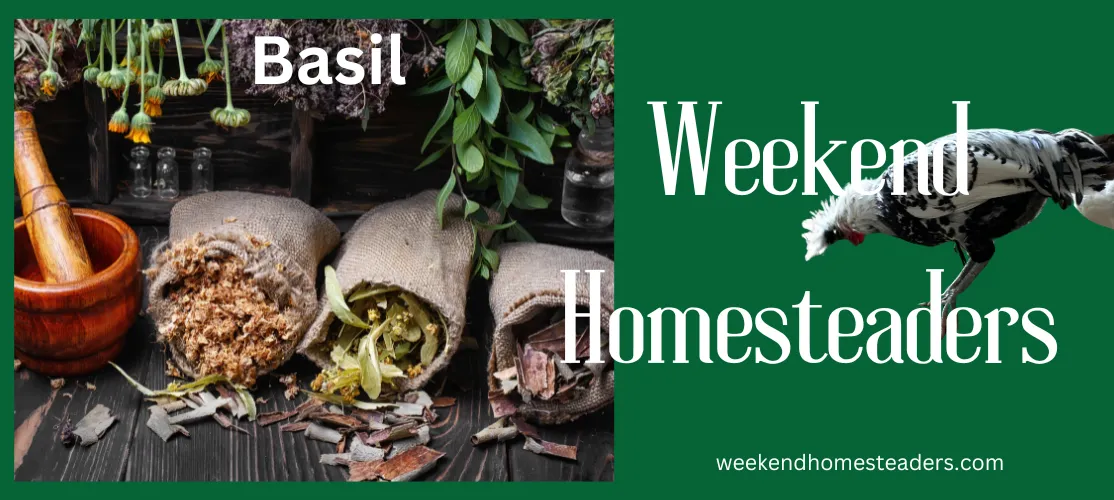
Basil: The Basics for People and Chickens
Basil, scientifically known as Ocimum basilicum, is a beloved herb known for its aromatic leaves and versatile uses in cooking, medicine, and even in the care of backyard chickens. Whether you're growing it for your kitchen or to boost the health of your flock, basil is a wonderful addition to any garden.
For People: Growing, Preserving, and Using Basil
Growing Tips
Basil is a warm-weather herb that thrives in sunny conditions. Here are some tips for growing basil successfully:
Planting: Basil can be started indoors 6-8 weeks before the last frost or directly sown in the garden after the last frost. It prefers well-drained soil and full sunlight.
Watering: Basil needs consistent moisture, especially during hot weather. Water at the base of the plant to avoid wetting the leaves, which can lead to fungal diseases.
Harvesting: Regular harvesting encourages the plant to produce more leaves. Pinch off the top leaves regularly to prevent flowering, which can make the leaves bitter.
Companion Planting: Basil grows well alongside tomatoes, peppers, and oregano, as it can help repel pests and improve the flavor of neighboring plants.
Preserving Basil
Basil can be preserved in several ways to enjoy its flavor year-round:
Drying: Harvest basil just before it flowers. Hang bunches upside down in a cool, dry place. Once dry, crumble the leaves and store them in an airtight container.
Freezing: Blanch the leaves quickly in boiling water, then plunge them into ice water. Pat dry and freeze them in a single layer before transferring to a freezer-safe bag.
Herb Butter or Pesto: Blend fresh basil with butter or olive oil to make herb butter or pesto. These can be frozen in small portions for later use.
Medicinal Benefits
Basil has been used in traditional medicine for centuries. Some of its key medicinal benefits include:
Anti-Inflammatory: Basil contains eugenol, a compound that has anti-inflammatory properties, making it useful in reducing swelling and pain.
Digestive Health: Basil can aid digestion by relieving gas, stomach cramps, and indigestion.
Antioxidant Properties: Rich in antioxidants, basil helps combat oxidative stress and supports overall cellular health.
Stress Relief: The adaptogenic properties of basil can help reduce stress and promote mental clarity.
Uses of Basil
Basil is incredibly versatile in the kitchen and beyond:
Culinary Uses: Basil is a staple in Italian cuisine, often used in sauces like pesto, as well as in salads, soups, and marinades.
Herbal Teas: Fresh or dried basil leaves can be brewed into a soothing herbal tea that aids digestion and provides relaxation.
Aromatherapy: Basil essential oil can be used in diffusers or added to massage oils for its calming effects.
For Chickens: Medicinal Uses and Practical Applications
Medicinal Benefits for Chickens
Basil isn’t just for people—your chickens can benefit from it too! Here are some of the ways basil can support the health of your flock:
Respiratory Health: The essential oils in basil can help keep your chickens' respiratory systems clear and healthy, especially in dusty environments.
Immune Support: Basil is rich in antioxidants, which can help boost your chickens' immune systems, keeping them healthy and reducing the risk of illness.
Stress Reduction: Just like with humans, basil can help reduce stress in chickens, which is especially useful during times of change, such as when introducing new birds to the flock.
How to Use Basil with Chickens
There are several ways you can incorporate basil into your chickens' routine:
Fresh Basil: Add fresh basil leaves to your chickens' diet by chopping them up and mixing them with their regular feed. Chickens enjoy the taste, and it provides them with added nutrients.
Dried Basil: During the winter months, dried basil can be sprinkled in their feed or in their bedding to provide the same benefits as fresh basil.
Nest Box Additive: Place dried basil leaves in nest boxes to help repel insects and provide a calming aroma that can reduce stress in laying hens.
Traditional Uses
Historically, basil has been used for a variety of purposes beyond cooking:
Cultural Significance: In many cultures, basil is considered a sacred herb. In India, it's revered in Hinduism as a symbol of protection, while in Italy, it's a symbol of love.
Insect Repellent: Basil has been traditionally used to repel insects. Its strong scent is effective in keeping mosquitoes, flies, and other pests at bay.
Fun Fact
Did you know that basil belongs to the mint family? This herb shares a family tree with other aromatic plants like peppermint, lavender, and rosemary. Its unique scent and flavor come from the essential oils in its leaves, which are particularly potent during the growing season.
Growing basil is a rewarding way to bring fresh, aromatic herbs into your kitchen, making every dish more flavorful. If you're ready to start or expand your herb garden, having the right tools and high-quality seeds is essential. I've gathered a selection of products and seeds that I personally use in my garden and homestead—take a look at my Amazon storefront to find everything you need to cultivate your own thriving basil plants and more. Happy gardening!
